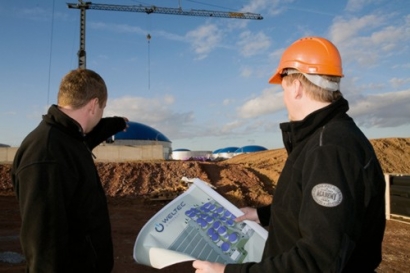
Tel Sultan, director of Lanes Farm Energy, said, “After in-depth discussions with over 10 technology providers, Weltec was selected to be our partner to deliver the technology.”
The plant will go live in late 2019 and deliver c7.3 million m³ of biomethane to the UK gas distribution network. This amount of eco-friendly natural gas equivalent is sufficient to supply about 9,600 households with sustainable energy around the clock, seven days a week.
The locally sourced feedstock contributes to the project‘s sustainability, according to Dr. Kevin Monson, Sales Manager at Weltec UK.
“Food leftovers account for more than half of the 80,000 tpa of substrate. Additionally, there is cattle and chicken manure as well as grass silage and hybrid rye,“ reported Monson.
The effective utilization of leftovers is a key reason why Charlotte Morton, Chief Executive of the Anaerobic Digestion & Bioresources Association (ADBA), considers biomethane projects such as the one in Pontefract to be ecologically and economically trend-setting.
According to ADBA, the anaerobic digestion of food leftovers could cover a third of the gas or power demand in the UK and create 35,000 new jobs.
“For a large project such as the one that is being rolled out for Lanes Farm Energy to be successful, a lot of experience, hard work, co-operation and proven technology is required," explained Carsten Hesselfeld, Sales Engineer at Weltec UK.
The gas production will take place in four stainless-steel digesters with a height of 8.8 m and an above-average capacity of 6,848m³ each. Weltec has decided to implement membrane upgrading to transform the biogas into high-quality biomethane. In a separation process comprising several stages, the raw biogas will be refined efficiently without methane slip. In this way, c850 standard m³ of biomethane that is suitable for feed-in will be produced every hour from December 2019 on.
Additionally, the biomethane production will yield digestate, which can be used as high-quality fertilizer, returning organic material and nutrients to the land.
Biomethane plants such as Lanes Farm Energy are expected to play an increasingly important role in the UK national energy mix. Compared to coal or oil, the biomethane production from leftovers enables carbon savings of about 90 percent.
“With the UK needing to boost energy security post-Brexit, and to re-balance its energy mix to reduce carbon emissions in accordance with the Paris Agreement, recovering clean, reliable biomethane from organic wastes and injecting it into the gas grid is a crucial piece of the energy jigsaw,” observed Monson, adding, “The provision of sustainable renewable heat and transport fuel from wastes means that biomethane will surely be further promoted by forward-thinking Governments. Biomethane plants are the epitome of the sustainable circular economy. The technology is proven and the gas grid is a ready-made distribution network.”

